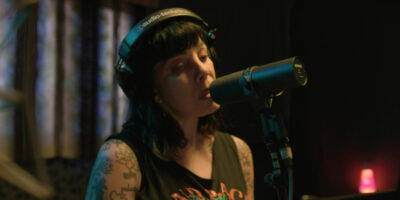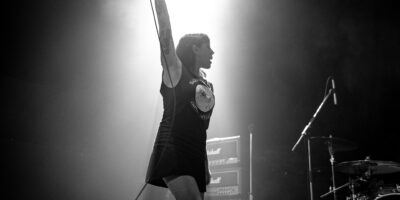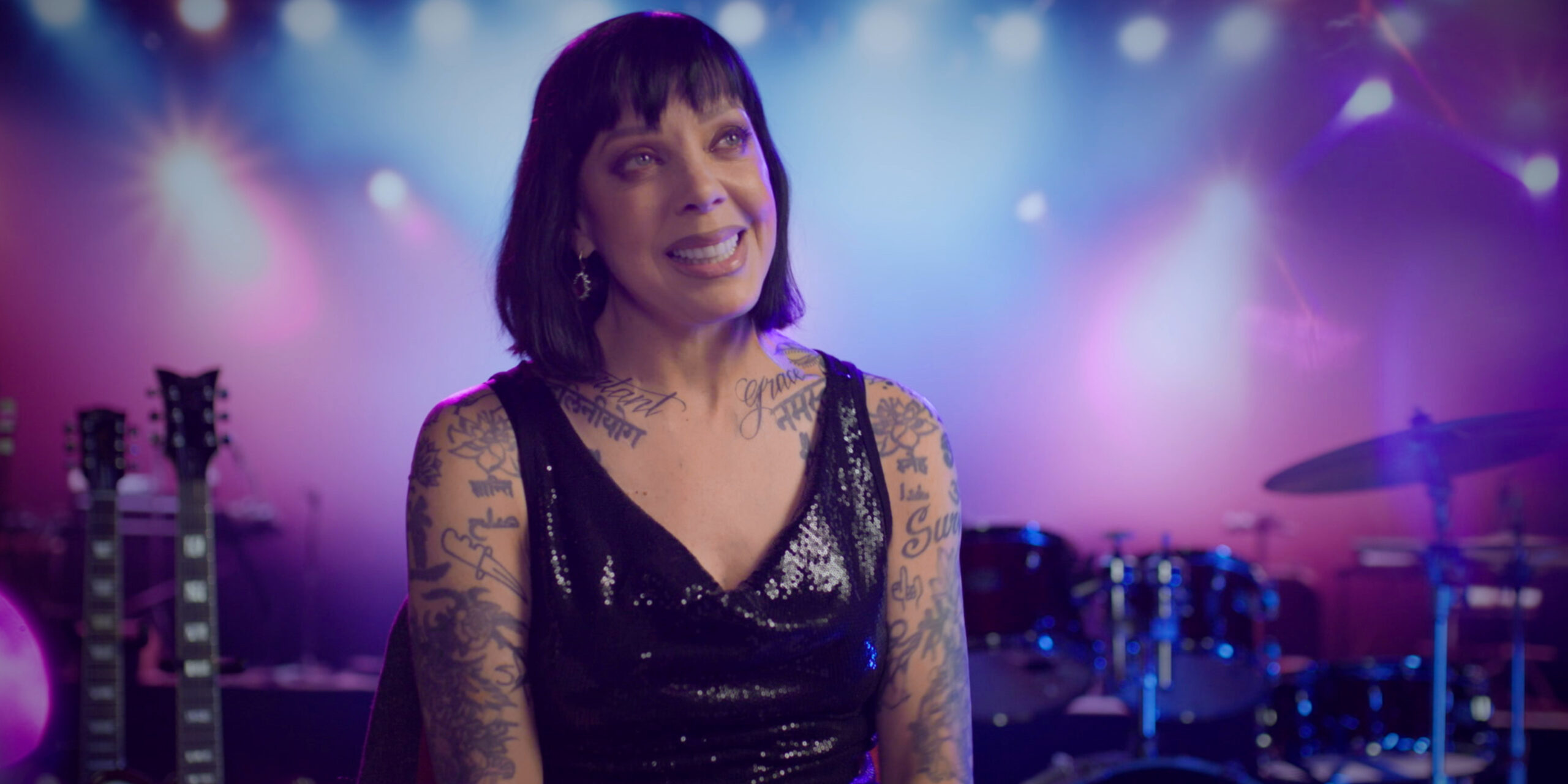When audiences watch Bif Naked in a music video or performing to a crowd, it’s easy to get swayed by her confidence and grit. But underneath the surface, the Canadian punk icon is a fighter.
The artist — given name Beth Nicole Torbert — thrived in the ‘90s, rocking the airwaves with hit singles “Spaceman” and “Moment of Weakness”, even making special appearances in TV shows like Buffy the Vampire Slayer. With a distinct sense of style, wearing tattoos on her sleeves, a piercing on her lip, and her staple black bangs, Bif set herself apart both from a visual standpoint and from an artistic lens. Her unfiltered lyricism led fans to resonate with her music in more ways than one.
Although Bif has always laid it bare in her songwriting, her Super Channel documentary directed by Pollyanna Hardwicke-Brown goes a step further, revealing more about the artist’s unconventional upbringing. She was born in India to a teenage mother and later adopted by missionaries, having to move around a lot during her youth.

Bif doesn’t hold back in sharing about her personal experiences with sexual assault and drug addiction, as well as discussing the pitfalls of breaking into a male-dominated music scene. In 2007, Bif had a health setback, getting diagnosed with breast cancer one week into her honeymoon. Despite the multiple challenges she faced under the spotlight, the punk singer always rose above.
In our interview with Bif in advance of her documentary’s release, she shared more about how music became an outlet for self-expression and healing, growing into her confidence without seeking the approval of men, finding meaningful female friendships during her cancer battle, and what she hopes young artists take away from her story.
After putting out your memoir in 2016, what made this the ideal time to release a documentary about your life and career?
I don’t know if there’s an ideal time to make a documentary, but I think that for me, I didn’t want to wait any longer. My manager of 32 years, Peter [Karroll] felt, along with the production team, that this was an ideal time, because they wanted to share my story with the world and Super Channel had faith in my story. Pollyanna Hardwicke-Brown is just such a lovely person. She’s like my guardian angel. She was such a fan and she, so thoughtfully, wove into the fabric of the cloth that is this documentary, all of the true things that she uncovered. I could never have found half of the things that she found. The documentary definitely goes places where the book couldn’t.

In the doc, you are candid about some hurtful experiences in your past. Many of them you previously addressed through confessional songs like “Tell on You”. How has songwriting helped you heal?
For me, music has always been very cathartic, especially when it comes to heartbreak. For some reason I can really enshroud my heartache or feelings of loneliness and disappointment in lyric writing. Then, to be able to convey that message on the stage has just been something that is very fulfilling to me. Throughout the years, I can look back at being a young artist and being able to just kind of express my disappointment, usually about guys, through the performances. It’s been very therapeutic, for sure, to be able to do that time and time again.
You were part of a few different bands and you were getting a lot of attention as the lead singer, but weren’t necessarily getting a say, because of the male-dominated scene that you were a part of. When Peter came along and offered to sign you as a solo artist, what was going through your mind?
When I first became a solo artist, I was really self-conscious. I was a young person. Of course, I didn’t have the confidence. The first couple of years, I was always seeking that validation from my former bandmates and the scene that I was in in Vancouver, so I would act extra tough on stage all the time. My manager would get really upset with me, because if I knew that the audience was made up of some of these scenesters, or some of the guys that I used to run around with, he would accuse me of putting on a more gruff appearance. I would be so offended. How dare you say that to me? But he was right. I would act extra tough, or I would sing extra growly to impress these guys, because I was insecure. I wanted them to think that I was the toughest girl of all the girl singers, but I wasn’t. I was a softy.
You also open up about battling breast cancer, and how that allowed you to connect with other people who were going through similar experiences. Can you share more about your health journey and what propelled you to use your platform to raise cancer awareness?
When I was diagnosed with breast cancer, it was obviously a great shock to me. I was a vegan and I felt like I was the epitome of health, so it was very surprising. Just being with the other women was something that was incredibly inspiring for me. We formed a walking group where we met once a week. Our walking group had over 20 women in it, so within a week, I was already meeting with other women, and they didn’t know who I was. They didn’t know what my job was. They didn’t know I was a singer. So I had instant autonomy. I had instant anonymity, and we had a commonality that was so important, and we had an instant sorority.
That was something I never had as an adult, ever. I only had these stinky guys on a tour bus prior to that. I had to get breast cancer to develop these incredibly nurturing, foundational relationships that I had never had before. Since that time, I’ve been a peer support volunteer and that’s something that still gives my life a lot of meaning and a lot of joy.
Shooting this documentary and looking back at certain moments of your life through this process, what is something that sticks out to your journey?
I have to say, I do not regret a single thing. I still remember sitting in this restaurant where I had a conversation with Peter, when I was still in the thrash band, Chrome Dog. I was worried about Chrome Dog, because they were just mean and nasty. The bass player would go on to play with me in my solo band, because he was my best friend. But I said to Peter, “Okay, well, if you’re going to be my manager, sir, my life is in your hands.” I think about that now and, oh my god, what a terrible kid I was to say such a thing to an adult man. I feel kind of guilty now, because what a responsibility to place on somebody. And boy, I was a pain in the ass all these years.
In the film, viewers find out that radio stations didn’t want to play your music for a long time because you had an edgy appearance. But you persevered, and achieved success being true to yourself. What advice would you give to young artists stepping into the scene today who are debating whether to embrace their authenticity?
I always maintain that there’s room for everyone. I’ve said that from the beginning, and I always say it now. You just have to be true to what you’re doing. Your fans are going to love what you’re doing. It doesn’t matter what anyone else says.
Bif Naked: A Documentary premieres this Friday, November 21, at 9 p.m. ET on Super Channel Fuse.



 Follow Us On Instagram
Follow Us On Instagram
